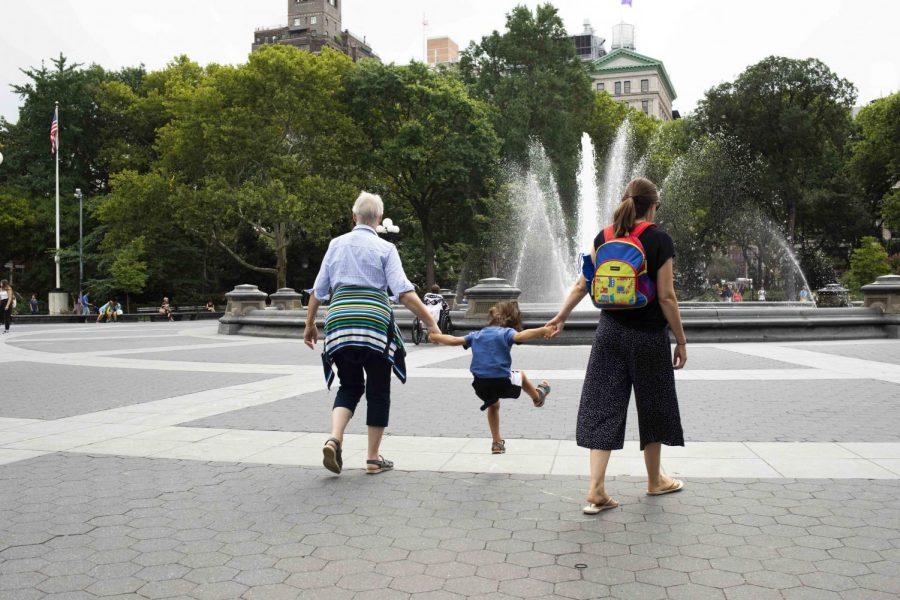Even if you’re a time management expert, school is stressful. It just is. When we aren’t doing one of the 500 things we need to do, we’re thinking about them — the assignment we haven’t started, the reading we haven’t finished, the internship we haven’t found. I’m not here to offer a solution to stress, but I do have one simple proposition. When you’re walking to and from class, take your headphones off — or your AirPods out. (To all the Airpod owners: maybe just do that anyway.)
The walks to class that punctuate your days might feel like a menial task — repetitive trips down the same streets — but they’re actually precious. Your walks are just that: yours. They are rare moments in which there’s nothing else you’re supposed to be doing — all you have to do is walk. When you plug in and press play, you’re draining that time of its value. By blocking out the sounds of the city — placing a physical layer between yourself and the outside world — you’re removing yourself from the present moment.
Rather than paying attention to your surroundings, you’re locked into a kind of “aural self-isolation.” Your headphones keep you plugged into your own personal bubble, trapping the nonstop stresses running through your mind and distracting you from the steps you’re taking, the city you’re occupying and the sounds around you. When you remove that layer, you can step outside of your personal world and step into the world of the city. By taking this step, you move closer to the sights and sounds of now, shifting your attention from the stresses of the past and the future to a more mindful place in the present.
This method of mindfulness doesn’t come with a price tag, something that is becoming increasingly rare when it comes to self-care. We’re living in a time in which self-care — that ever-elusive ideal — has become commodified. Want to meditate? Sure, pay $25 for a class at MNDFL. Or subscribe to Headspace for $13 a month. Want to be more mindful? Drop $10 and you can become Zen as F*ck. Rather than being something to cultivate, self-care has become something that can be branded, bought and bagged. Self-care shouldn’t be something that is only accessible to those with inordinate amounts of money to spend.
Or maybe it’s not a financial issue — you just don’t have the time. Between classes, internships, part-time jobs and hopefully sleeping, who does? Self-care needn’t be expensive or time-consuming; ditching your headphones uses time you’ve already allocated to walking, and it’s free! You don’t need to be sitting cross-legged in a silent room to give your brain a break. You don’t need to spend $60 on a face mask to relieve stress. Taking care of your mind really can be as simple as taking off your headphones.
Maybe you just can’t live without music. But the city has its own soundtrack: a chorus of honking cars, a choir of chirping birds, a compilation of overheard conversations. Washington Square Park alone holds multitudes — from the Piano Man to lone saxophonists to the barks from the two dog parks, there’s no shortage of sonic stimulation.
It’s less about any one particular sound and more about letting yourself listen. When you’re wearing headphones, it’s easy to stay locked into your mind, to forget the actual place and time you are occupying. When you tune in, you’re tuning out of the magical city that surrounds you. Don’t worry — I’m not suggesting that you stop listening to music all together, nor do I doubt the quality of your Spotify playlists. I too say “I love this song!” after every song on my own playlist. What I am suggesting is this: stop listening to music when there’s so much else to listen to.
Taking off your headphones and paying attention to the sounds of the present moment is an easy way of intentionally focusing your attention — one of the fundamental strategies of mindfulness. Practicing mindfulness has been found to decrease depressive symptoms, anxiety and stress for college students. So although removing your headphones isn’t the only way to become more mindful, it’s a good place to start.
If you allow yourself to listen, you begin to hear a lot more. Taking your headphones off isn’t going to change your life. But this simple act of breaking the barrier between yourself and the present repurposes walking to class as something much greater than a means to an end. Your treks to class are an opportunity, giving you space and time to rest your mind, to soak in the sights and sounds of the city, and to live in the moment.
We hear the term “self-care” all the time, but what does it really mean? To whom is it available and in what ways is it attainable? “The Pursuit of Happiness” will explore practical ways for NYU students to take care of themselves, proving that being broke and busy isn’t a barrier to self-care.
Hope Rangaswami is sophomore in CAS majoring in English and Environmental Studies.
Opinions expressed on the editorial pages are not necessarily those of WSN, and our publication of opinions is not an endorsement of them.
Email Hope Rangaswami at [email protected].























































































































































